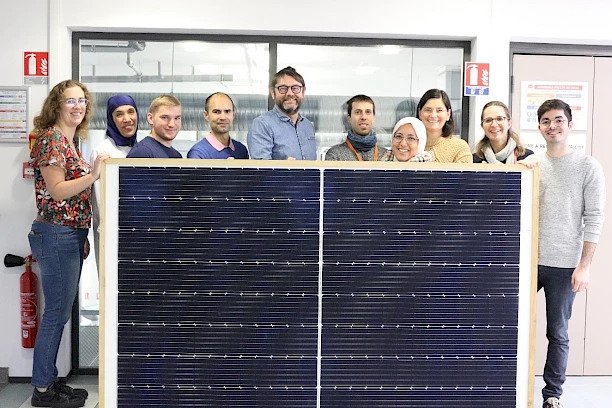Researchers at the National Solar Energy Institute (INES) – a division of the French Alternative Energies and Atomic Energy Commission (CEA) – have developed a heterojunction (HJT) solar module for residential applications based on eco-design principles.
The demonstration module has a power output of 566 W, an average efficiency of 22.9%, and features a gapless design. The HJT cells are manufactured in France on CEA’s pilot line at INES and include innovations limiting the consumption of indium and silver.
“It achieves a very low carbon footprint of 317 kgCO2eq/kWp compared to standard Chinese products (700 to 800 kgCO2eq/kW) and places our laboratories among the leaders in Europe,” CEA said in a statement.
The new module uses Norwegian-made silicon wafers with a thickness of 130 microns instead of 170 microns, thereby reducing the carbon footprint on a cell scale. The wafers’ polysilicon was sourced from Germany.
The panel is fully assembled in France and uses 2 mm glass. It features a frame made of wood material available in Europe, replacing the standard aluminum frame. This reportedly reduced the carbon footprint by more than 50 kgCO2eq/kW.
The low carbon mix in the electricity mix in Germany, Norway, and France was the main factor in reducing the module’s carbon footprint. According to CEA, these countries have a carbon mix of 650 gCO2eq/kWh, 29 gCO2eq/kWh, and 52 gCO2eq/kWh, respectively, compared to the Chinese mix, with a carbon balance of 1023 gCO2eq/kWh.
“A ‘design for recycle' approach has led to the choice of fluorine-free thermoplastic encapsulants and back sheets of European origin, which will facilitate recycling,” said CEA.
The eco-design approach included a life cycle assessment in accordance with ISO14040 and ISO14044 standards.
This content is protected by copyright and may not be reused. If you want to cooperate with us and would like to reuse some of our content, please contact: editors@pv-magazine.com.



By submitting this form you agree to pv magazine using your data for the purposes of publishing your comment.
Your personal data will only be disclosed or otherwise transmitted to third parties for the purposes of spam filtering or if this is necessary for technical maintenance of the website. Any other transfer to third parties will not take place unless this is justified on the basis of applicable data protection regulations or if pv magazine is legally obliged to do so.
You may revoke this consent at any time with effect for the future, in which case your personal data will be deleted immediately. Otherwise, your data will be deleted if pv magazine has processed your request or the purpose of data storage is fulfilled.
Further information on data privacy can be found in our Data Protection Policy.